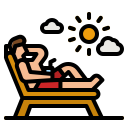-

Robin
10 months ago
Home Exchanging with allergies
How home exchanging with PLU opened the world to me

When I started home exchanging at the turn of the century, home exchanging was one of the few options to camping that allowed me to travel and self-cater my meals to cope with my food allergies. “Tell me more”, I said when a colleague reported that he had taken his family to Europe on a home exchange and how much they had enjoyed shopping at farmer’s markets and preparing meals “at home”.
When you exchange homes, you really do get a “fully equipped kitchen”. Real people live there and you are more likely to find a variety of small appliances, equipment and cooking options. I’ve been fortunate enough to find bread makers, saving me hours of work and slow cookers, allowing me to return to a fully cooked meal at the end of a long day of exploring. No more heating something in a microwave perched on top of a bar fridge in a hotel that promised a kitchenette.
People Like Us has several search filters to help members with pet and environmental allergies find suitable exchange homes in which they can enjoy good health during their stay and connect with one another. These include dog and cat-free homes, smoke-free, fragrance-free, carpet-free and hypoallergenic which some interpret to refer to bedding. Scroll down in the filters to find the Allergens section.

Members who are allergic to pet dander can quickly rule out homes that are unlikely to be a good match, when “Pets Welcome” is prominently displayed in search results, without having to open the listing.
For People Like Us members with allergies, characteristics like these are as important, if not more so, than location when searching for a compatible exchange partner. I frequently browse using some of these filters, without entering a location. Then I put potentially suitable homes in locations we might consider in future in my favourites. I might reach out with a message explaining how I think we are a good match and asking the member to consider us as they make future plans, especially if they mention allergies in their profiles.
While needing a pet-free or a fragrance-free home means there is a smaller group of potential exchangers, the good news is that those who are a good match can be very motivated to make such an exchange work. Chances are, if they ticked those Allergen filters when creating their home's description, those exchangers may have similar needs. There are well over a thousand members with the allergy filters I generally use.
People like Us even has filters for people with some dietary restrictions, such as Kosher and meat-free kitchens.
When exchanging, I take some measures to reduce my risk of exposure to food allergens by choosing homes with dishwashers and bringing my own dishwasher-safe cutting boards, some vials of spices and flavourings and carefully wiping a fridge when I arrive. I always ask exchangers their adult beverage of choice or whether they can enjoy the homemade bread I plan to leave them, in case they have food allergies too. I also travel with allergen-blocking pillow covers and unscented toiletries and laundry products.
I have been fortunate enough to have some hosts agree to allow me to order some difficult-to-find safe foods delivered to their homes in advance of my visit. And I offer to scout for or pick up specialty food items for them before they come to my home. Even when ordering has not been possible, I’ve been able to tap into the hosts’ local knowledge of specialty food stores nearby, which helps me settle in and stock up faster.
While food is an important part of travel, and many travellers enjoy sampling restaurants, cooking with fresh local ingredients is one way to sample local fare for travellers who cannot safely dine out. And it’s better than staying at home and letting allergies limit your travel. Home exchanging with PLU has opened the world to me and I’ve now enjoyed exchanges on three continents.
Robin lives with her husband in Victoria, the capital of British Columbia, on the southwest coast of Canada, is recently retired and able to travel frequently.
People Like Us is the world's most trusted home exchange community. We believe in sharing, trust, generosity, respect, communication, equality, cooperation, honesty, hospitality, friendship, flexibility and adventure. We take pride in our homes and we care about the environment in which we live: our village, city, country and our planet. We care about the ethos of home exchange and we do it because we love the experience and the friendships that it generates.
Locations
Contact
People Like Us
Home Exchange Pty Ltd





























































































































